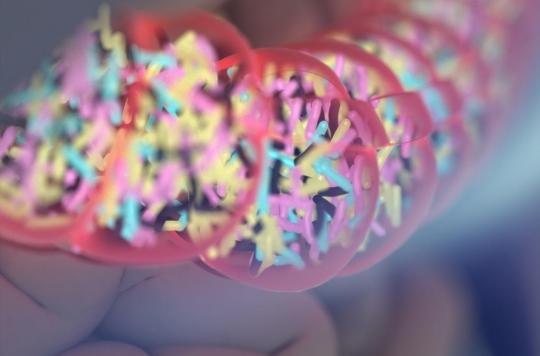A study conducted on baboons shows that 97% of the characteristics that make up our intestinal microbiota, including the variety and abundance of bacteria, are hereditary.

- Contrary to what previous work suggested, our intestinal microbiota is not only influenced by environmental factors, such as diet or taking medication. 97% of the characteristics of our microbiota are actually hereditary.
- This heritability of microbiota characteristics was possible thanks to the observation of wild baboons for 14 years. It was by studying the microbiota of primates over this long period that researchers realized that the richness and variety of intestinal bacteria were hereditary.
What are the origins of the composition of our intestinal microbiota? Many scientific works have previously looked into this question, and have concluded that the bacterial richness that populates our intestines is mainly influenced by our way of life. Our diet, but also the drugs we ingest have an impact on the quality and richness of our microbiota which, in the event of an imbalance, can cause the appearance of pathologies such as diabetes, obesity, chronic inflammatory diseases of the bowel or colorectal cancer.
But a new study conducted by the University of Notre-Dame (United States) calls into question this environmental conception of the intestinal microbiota. Published in the journal Scienceit shows that several characteristics of the intestinal microbiota are hereditary.
A 14-year study on baboons
To reach this conclusion, the researchers examined more than 16,000 gut microbiota profiles collected over 14 years from a long-studied population of baboons in Kenya’s Amboseli National Park. According to them, several traits of the microbiota inheritable in baboons are also inheritable in humans.
“Environment plays a bigger role than genes in shaping the microbiome, but this study allows us to move from the idea that genes play a minimal role in the microbiome to the idea that genes play an ubiquitous role. , even if it is minimalunderlines Elizabeth Archie, professor in the department of biological sciences and principal researcher of the study.
What varies from previous studies is the long-term approach. While all previous work measured microbiota at some point, the research team here used faecal samples from 585 wild Amboseli baboons, with typically more than 20 samples per animal. So even though the microbiotic profiles of the samples showed variations in the baboons’ diet depending on the season, they still found that 97% of the characteristics of the microbiota, including the overall diversity and abundance of individual microbes, were significantly heritable. For comparison, percent heritability was estimated to be only 5% when samples were analyzed from a single point in time.
Such a hereditary composition in humans
However, the researchers point out, this is precisely how most studies on the human microbiota have been carried out. “It really suggests that in humans, part of the reason researchers haven’t found heritability is because they don’t have a decade and a half of fecal samples in the freezer and they don’t have all the initial host information they need to uncover those details.”says Professor Archie.
The discovery of the hereditary nature of the genes of the intestinal microbiota now opens the way to the future identification of microbes shaped by genetics. In the future, therapies may be tailored to people based on the genetic makeup of their gut microbiota.
.















